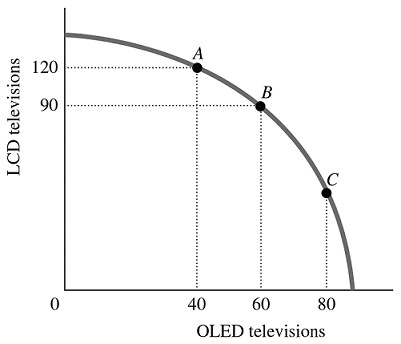The rationality assumption states that
A) all actions taken by consumers are based on what is good for society.
B) people make decisions regardless of how the outcome will affect them.
C) people make decisions to buy only those goods that they need rather than goods that they want.
D) people do not intentionally make decisions that would leave them worse off.
D
You might also like to view...
Which of the following statements about the concept of opportunity cost is true?
A. The opportunity cost of a decision is the cost of all possible alternatives to the good produced. B. Many decisions do not involve an opportunity cost. C. If you have an economics final and an American history final tomorrow, the opportunity cost of studying five hours for your economics exam is the five hours you cannot study for your history exam. D. The opportunity cost of a college education at a school where you have to drive 100 miles per week is the cost and maintenance of owning an automobile to drive to and from school.
People use water for trivial, unimportant purposes because
A) there is little demand for water. B) its relative price is very low. C) they don't realize how essential water is to life. D) they don't realize the world's supply of water is limited. E) they underestimate the total demand for water.
Your roommate, Serafina, a psychology major, said, "The problem with economics is that it assumes that consumers and firms always make the correct decision. But we know that everyone's human, and we all make mistakes." Do you agree with her comment?
A) Yes, I agree with her. One cannot make predictions about economic behavior because in reality people make incorrect choices in many situations. B) I disagree with her. Economics does not study correct or incorrect behaviors but rather it assumes that economic agents behave rationally, meaning they make the best decisions given their knowledge of the costs and benefits. C) Yes, I agree with her. Economic theory should allow for irrational behavior so that we can have more reliable predictions. D) I disagree with her. If we cannot assume that decisions are correct, then we will not be able to examine the moral implications of these decisions.
Refer to the information provided in Figure 2.5 below to answer the question(s) that follow. Figure 2.5Refer to Figure 2.5. The best point for society would be
Figure 2.5Refer to Figure 2.5. The best point for society would be
A. either Point B or Point C, as the total amount being produced at either of these points is approximately the same. B. at any of the labeled points, as all of the points represent an efficient allocation of resources. C. Point C, as at this point there are approximately equal amounts of LCD and OLED televisions being produced. D. indeterminate from this information, as we don't have any information about the society's desires.